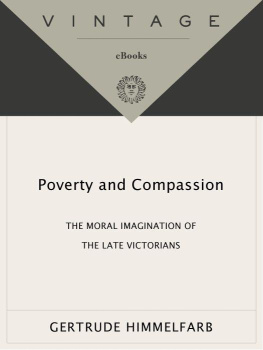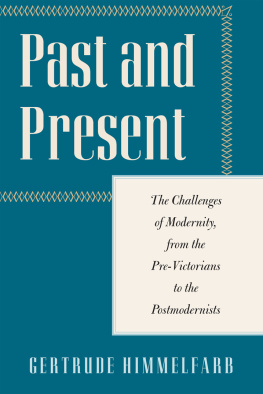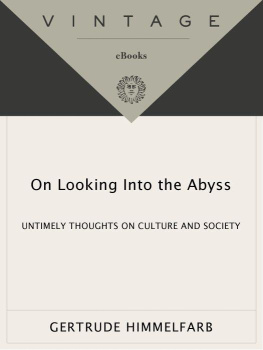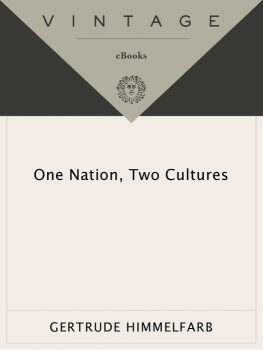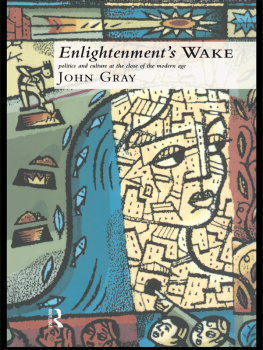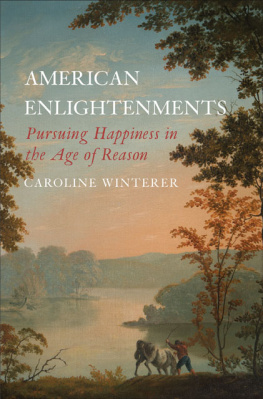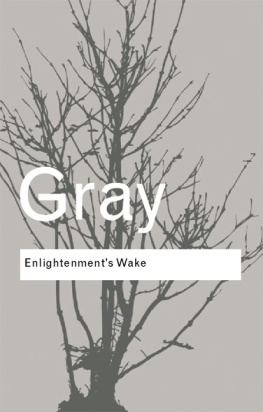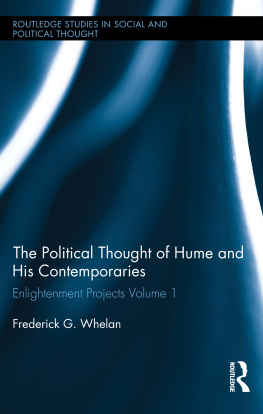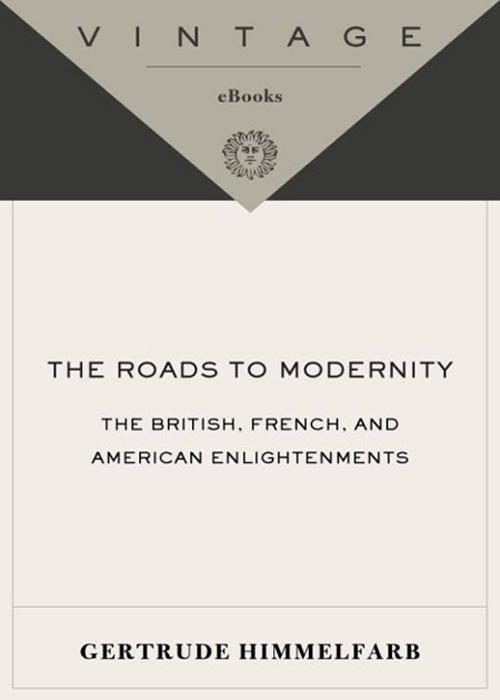
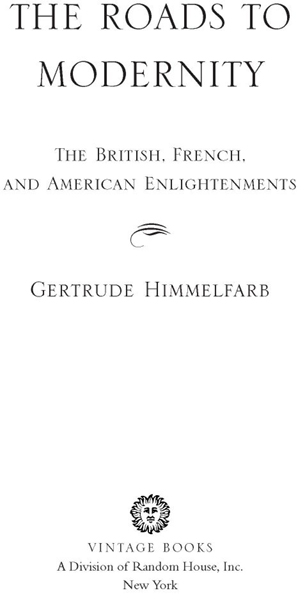
Table of Contents
To my husband,
once more and evermore
Acclaim for Gertrude Himmelfarbs
THE ROADS TO MODERNITY
Ever since Immanuel Kant posed his famous question in 1784What is Enlightenment?critics and commentators have searched for an answer.... In the end it is always harder to ask Kants question than to answer it. But Ms. Himmelfarb reminds us of why we should continue to try. The Wall Street Journal
Elegant, lucid and intelligent. The Providence Journal
Wonderfully argued.... A potent [book]. The Washington Times
[Himmelfarbs] writing... has a verve and sharpness.... It is a pleasure to read. The New York Review of Books
Masterful and elegant.... A valuable book, and most valuable in its reconstruction and appreciation of the British Enlightenment. Commentary
[Himmelfarb is] one of todays most important practitioners of history.... The Roads to Modernity reveals more clearly than any previous book on the subject the environment in which these ideas and practices were born and how firmly they still mold the moral sense and common sense of the English-speaking world today. The New Criterion
PREFACE
One of my early collections of essays, Victorian Minds, had a section entitled Proto-Victorians. Not, I am pleased to say, Pre-Victoriansproto, according to my dictionary, suggesting not only first in time but also first in rank or importance. Proto, on that occasion, was meant to include Edmund Burke, Jeremy Bentham, and Thomas Malthus. Other of my books extended that category to admit Adam Smith, John Wesley, Thomas Paine, and the American Founders. I am happy now to bring into the foreground what was once in the background, to pay proper tribute to thinkers and movements of the eighteenth century without whom the nineteenthand, indeed, the twentieth and twenty-first centurieswould have been unthinkable.
After these many years, I am also returning to the scene of my youth. My first book, on Lord Acton, brought me into the heart of Victorian England. But I came to Acton by way of the French Enlightenment and Revolution. It was that subject I was studying with one of Americas leading scholars of the period, Louis Gottschalk; my masters thesis was on Rousseau and Robespierre. And it was Actons work on the French Revolution which first introduced me to the most learned and profound historian of the time and thus to the riches of Victorian England. I have now returned to the French Enlightenment, humbled by the wealth of scholarship that has very nearly transformed this subject in the past half century, but that has not obscured the problems which intrigued me then and are still a challenge to historians today.
I was moved to return to the Enlightenment by two invitations: the first, in August 1996, to participate in a colloquium at Castel Gandolfo presided over by the Pope; the second, in May 2001, to deliver the Elie Kedourie Lecture at the British Academy in London. The subject of the colloquium in Rome was Enlightenment Today, and the paper I was asked to deliver was on poverty and the Enlightenment.1 This aspect of the Enlightenment had not previously engaged menor had it most historians of the Enlightenmentand in researching it I found the dichotomy between the British and French Enlightenments even larger than I had suspected. In my later lecture at the British Academy, I developed the theme of the two Enlightenments beyond the narrow focus of poverty to the larger social and philosophical issues that separated the two countries. In the present book, I have expanded the theme further to embrace the American Enlightenment as well, introducing a third political dimension to the Enlightenmentor Enlightenments, as I now thought of them.
This short book is an interpretive essay rather than a comprehensive scholarly narrative. But it is based, I hope, on the best scholarly evidence. I have quoted extensively from the sources (from primary sources especially), in part because some of my theses controvert the received wisdom and therefore need confirmation and justification, but also because the contemporary writers were so remarkably articulate and thoughtful. It would be sinful to try to paraphrase Smith, Burke, Tocqueville, the American Founders, and others who expressed so trenchantly and elegantly what could only be trivialized and vulgarized by summary or restatement.
My respect for these eminent thinkers also makes me respectful of their vocabulary. Thus, I have retained America where one might now say the United States; Tocquevilles Democracy in America signifies something quite different from Democracy in the United States. (As late as 1893, James Bryce published his monumental work under the title TheAmerican Commonwealth.) So, too, the masculine noun and pronoun, as used at the time, had generic, not gender, connotations that would be violated if they were rendered in the currently correct fashions.
Because the American and French Enlightenments have brought me into what had become relatively unfamiliar terrain, I am grateful to Alan Kors, of the University of Pennsylvania, for reading the first draft of the chapter on France, and to Wilfred McClay, of the University of Tennessee, for reading that on America. Both provided the critical reading I asked for and made helpful suggestions and bibliographical references. And to both I extend the usual absolution, that they not be held responsible either for my views or my faults.
I am also grateful to the Library of Congress for extending to me not only the resources of the library but also the assistance and counsel of some of their staff, including Carol Ambruster of the European division and Prosser Gifford and Lester Fogel of the Office of Scholarly Programs. The American Enterprise Institute facilitated the borrowing of books from the Library of Congress, and lent me the services of their interns, Hans Allhoff and Erin Conroy, who, in successive years, fetched books, Xeroxed articles, and hunted up the occasional elusive note reference.
It gives me great pleasure to work once again with Ashbel Green at Knopf. This is the ninth book of mine that he has seen through the press in the past thirty-five yearssomething of a record, I suspect, in this age of volatile publisher-author relationships. It is particularly fitting that Ash should be presiding over this book, for one of his ancestors has a cameo role here: an Ashbel Green served in the Revolutionary War, was the chaplain of Congress, later the president of The College of New Jersey (now Princeton), and later still the biographer of an earlier president of the college, John Witherspoon, who helped bring the British Enlightenment to America.
Finally, I thank my husband, Irving Kristol, who has read and commented on the whole of this manuscript, as he has all of my previous books. Many other writers have paid tribute to him as an editor and mentor, but no one has profited more from his wise counsel, his good nature, and his unfailing devotion.
PROLOGUE
This book is an ambitious attempt (more ambitious than its length warrants) to reclaim the Enlightenment from critics who decry it and defenders who acclaim it uncritically, from postmodernists who deny its existence and historians who belittle or disparage it, above all, from the French who have dominated and usurped it.1 In reclaiming the Enlightenment, I propose to restore it, in good part, to the British who helped create itwho created, indeed, a very different Enlightenment from that of the French.
Next page

